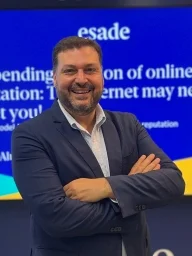Meta and Esade join forces to analyze the impact of immersive technologies in education
Meta and Esade have announced they are working together to study the impact and benefits of immersive technologies such as augmented reality (AR), virtual reality (VR) and mixed reality (MR) in the realm of education. This research project, entitled Business education in the metaverse era and led by Esade in Spain, will address the opportunities and challenges of generative AI and the metaverse for business and society, and also the changes needed in the education sector in order to build these technologies into the learning experience. Specifically, Esade’s research will focus on the possibilities of immersive technologies to drive a more inclusive education system and improve the job prospects of young people in Spain, whilst closing the gap between the skills required by companies and organizations and those available in today’s job market.
This announcement followed the recent survey by the XR Association and the International Society for Technology in Education according to which two thirds (67%) of educators and professors expect immersive technologies to be used regularly in schools and 77% advocate the use of extended reality (XR) to increase the curiosity and engagement of students in the classroom.
“Recent developments in generative AI and immersive technologies (AR/VR/XR) are transforming the education industry in previously unthinkable ways. Personalization and individualization with virtual tutors, and likewise the ability to connect and create shared virtual spaces are now an everyday reality. The great challenge is, therefore, how future generations can be prepared for a world using tools as yet unknown,” highlighted Esteve Almirall, professor in the Esade Department of Operations, Innovation and Data Science and coordinator of this research project in Spain.
Meanwhile, Ivan Bofarull, Chief Innovation Officer at Esade, was clear that the intersection between the metaverse and AI “will change for the better the role of both students and professors in the learning process, enabling it to give them all greater value. In addition, academic establishments will have a historic opportunity to widen their impact on society, thereby redefining their role in the 21st century.”
Independent research program in the EU
This collaboration is part of a wider independent research program funded by Meta throughout Europe. Academics and think tanks from the UK, Italy, Spain, France and Germany will examine how immersive technologies can contribute to the future of education, improve current learning experiences, boost job prospects for young people and contribute to professional and executive training. The findings of the program will be published at the end of this year. “Immersive technologies already provide exciting new teaching and learning modes and have a huge potential to transform education and training across a far larger sphere. Early academic studies reveal that VR can improve different learning outcomes ranging from grasping and retaining knowledge to student engagement. Collaborations like this with Esade experts are important in order to fully understand and take advantage of this opportunity,” according to José Luis Zimmermann, Meta Director of Public Affairs in Spain and Portugal.
Besides collaborating with Esade in Spain, Meta supports research projects at different European institutions, such as the University of Glasgow in the United Kingdom, which will examine the practical and operational aspects of using XR technologies in education, including teachers’ skills and their effective roll-out in the classroom. In Germany, Straightlabs (GmbH & Co. KG) together with Bertrandt AG will explore the potential of VR and immersive learning technologies in life-long education. In France, meanwhile, Immersive Learning Labs will study how the metaverse and immersive technologies can support higher education, vocational training and further training in different industries, in both soft and hard skills. Meanwhile, the LUISS Guido Carli University, Italy, will conduct a field experiment to analyze how immersive technologies can improve collaborative learning experiences in educational contexts compared to conventional, 2-D video conferences.
Nick Clegg, President of Global Affairs at Meta, announced the launch of this European research project today in his article “How the metaverse is transforming education" in which he explains how immersive technologies improve learning experiences by rethinking the classroom, bringing professors and students together in shared virtual spaces, improving training and providing new opportunities for lifelong learning.




